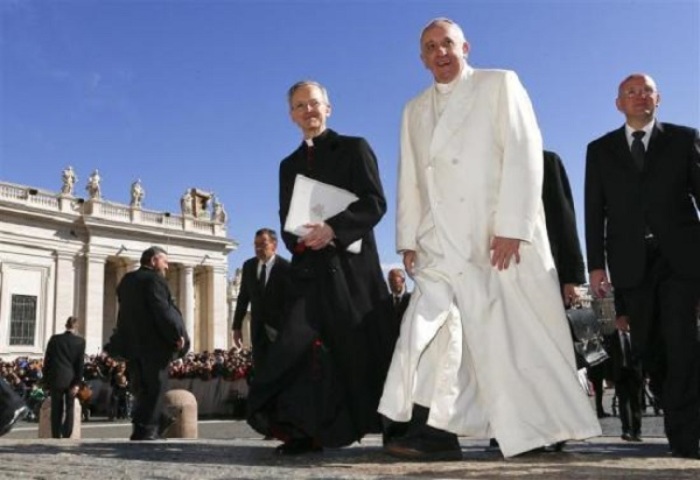Major Vatican Document Says Unjust Discrimination Against Gay People Should Be Avoided; Upholds Traditional Marriage

A major document by the Vatican has said that unjust discrimination against gay people needs to be avoided and that children of same-sex unions must be cared for as any other, but it still maintains opposition to same-sex couples adopting children and has affirmed traditional teachings on marriage.
The Instrumentum Laboris is a result of Pope Francis' call in October 2013 for Roman Catholic bishops around the world to convene and discuss matters of family and the Christian faith.
"On unions of persons of the same sex, the responses of the bishops' conferences refer to Church teaching. 'There are absolutely no grounds for considering homosexual unions to be in any way similar or even remotely analogous to God's plan for marriage and family. [...] Nonetheless, according to the teaching of the Church, men and women with homosexual tendencies 'must be accepted with respect, compassion and sensitivity. Every sign of unjust discrimination in their regard should be avoided,'" the lengthy document reads.
It adds that every bishops' conference spoke out against redefining marriage between a man and a woman.
"The episcopal conferences amply demonstrate that they are trying to find a balance between the Church's teaching on the family and a respectful, non-judgmental attitude towards people living in such unions," the document continues.
"On the whole, the extreme reactions to these unions, whether compromising or uncompromising, do not seem to have facilitated the development of an effective pastoral programme which is consistent with the Magisterium and compassionate towards the persons concerned."
The bishops have also said that they are "clearly opposed to legislation which would allow the adoption of children by persons in a same-sex union, because they see a risk to the integral good of the child, who has the right to have a mother and father."
However, the responses to the conferences emphasized that when such couples request their child to be baptized, the child must be "received with the same care, tenderness and concern which is given to other children."
"Many responses indicate that it would be helpful to receive more concrete pastoral directives in these situations. Clearly, the Church has the duty to ascertain the actual elements involved in transmitting the faith to the child. Should a reasonable doubt exist in the capability of persons in a same sex union to instruct the child in the Christian faith, proper support is to be secured in the same manner as for any other couple seeking the baptism of their children," the Instrumentum Laboris states.
In October's Extraordinary General Assembly in 2014, the synod fathers will analyze the information presented in the document and respond to the new challenges before families. Later, the Ordinary General Assembly in 2015 will reflect further on the points discussed and formulate appropriate pastoral guidelines.
In many ways the document echoes statements Pope Francis has made in the past, such as ub an in-depth interview in September 2013 where he backed Church teachings on traditional marriage, but said that LGBT people "must be accepted with respect, compassion and sensitivity."
The National Catholic Reporter suggested on Thursday that the new document is "uneven" and said that it will require in depth analysis.
"Parts are provocative, parts are stale, and much of it could have benefited from greater input from the people being discussed," the publication wrote.
"This document attests to the fact that the synod will have a lot on its plate when it meets this autumn. The issue of family life is central and integral to the proclamation of the Gospel and family life, as we Catholics understand it, has been permitted to deteriorate in many cultures in the West and now faces different challenges in those parts of the world where the Church is growing fastest, such as Africa and parts of Asia."




























